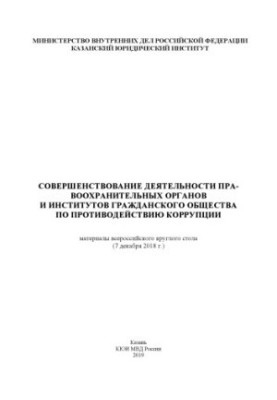Improving the work of the PA and civil society institutions to combat corruption.
 Instant download
Instant download
after payment (24/7)
 Wide range of formats
Wide range of formats
(for all gadgets)
 Full book
Full book
(including for Apple and Android)
The book “Improvement of anti-corruption software and civil society institutions”, written by a team of authors, represents an important contribution to the study of one of the most pressing problems of modern society corruption. This work appeals to readers interested in political science, law, sociology, and active civic participation. It will be especially useful for students, researchers, as well as anyone who seeks to understand the mechanisms of the fight against corruption and the role of civil society in this process. The book discusses various aspects of anti-corruption, including theoretical foundations, practical examples and recommendations for improving the activities of non-governmental organizations (NGOs) and civil society institutions. The authors raise important questions about how civil society can influence state structures and contribute to the formation of transparent and responsible government. The reader will be able to see how the interaction between different participants in the process can lead to real changes in society. One of the key themes of the book is the need to integrate the efforts of public and private institutions to create an effective anti-corruption system. The authors emphasize that corruption is not only a problem of individuals, but also a systemic threat that requires an integrated approach. In this context, the book offers the reader not only an analysis of existing problems, but also practical recommendations for improving the interaction between state bodies and civil society. The style of the authors is distinguished by clarity and accessibility, which makes complex concepts understandable even for an unprepared reader. They use many examples from real practice, which allows a deeper understanding of how theoretical ideas are applied in practice. The book is filled with analytical materials, statistics and case studies, which makes it a valuable resource for anyone interested in corruption and civic participation. The book will be of interest not only to specialists in the field of law and political science, but also to a wide audience, including activists, journalists and everyone who wants to contribute to the fight against corruption. It can become a basis for discussions on the role of civil society in the formation of an open and transparent state, as well as a source of inspiration for those who seek to take active action in this area. If you are looking for literature that will help you better understand the mechanisms of corruption and how to overcome it, then “Improving the work of anti-corruption software and civil society institutions” will be an excellent choice. This book not only informs, but also encourages action, inspiring the reader to actively participate in public life and the struggle for justice. Thus, this work is not just a collection of theoretical knowledge, but a practical guide that can help each of us to become part of the solution to the problem of corruption. In today’s world, where corruption remains a major obstacle to development, this book is an important step towards creating a more honest and open society.
LF/436377900/R
Data sheet
- Name of the Author
- Collective of authors
- Language
- Russian

























